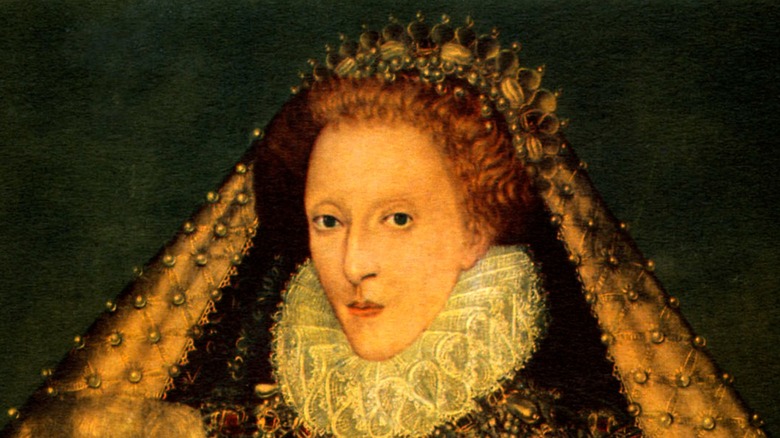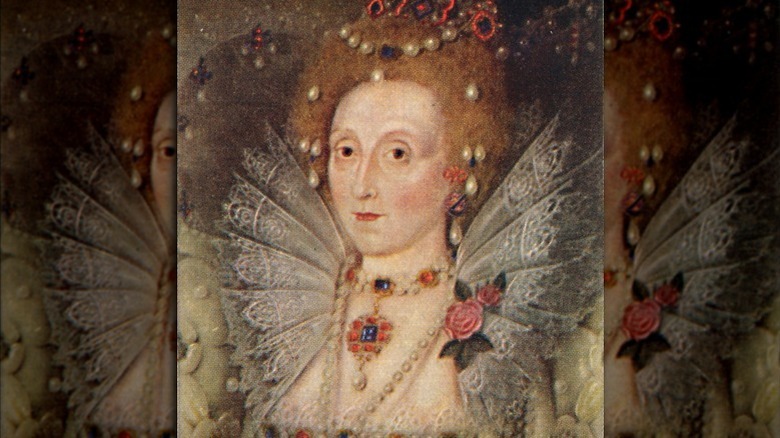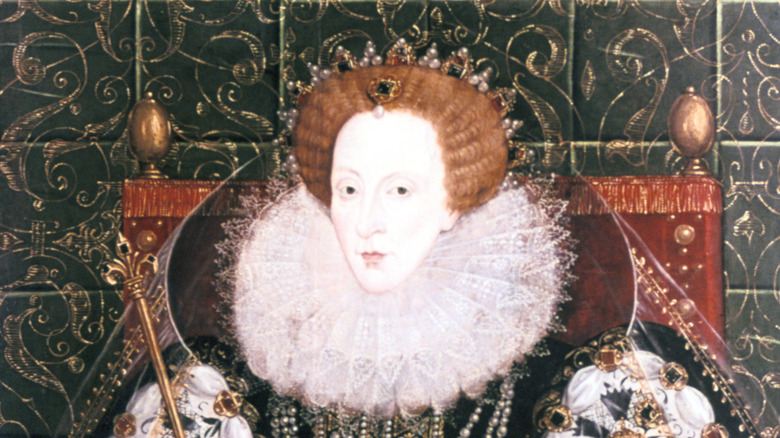The Queen Elizabeth I Theory That Would Change Everything
You can say what you want about England's monarchy, but one fact that remains nearly inarguable is that the kingdom has been at its heights of peace and prosperity when there was a woman on the throne. Of the six longest-serving monarchs, three are women: Elizabeth II and Victoria, who served the longest, respectively, and the one who paved the way for both of them — Elizabeth I.
Among other things, Queen Elizabeth I's reign saw a period of relative peace after years of violent religious conflict, a flourishing of the arts (including the career of William Shakespeare), and the historic defeat of the Spanish Armada. Liz The First even developed her own little cult of personality, getting celebrated as "The Virgin Queen" due to her refusal to marry, and even getting an entire era — the "Elizabethan Era" — named after her.
What is it about having a woman on the throne that creates peace and prosperity in England? Well, in the case of Elizabeth I, at least, it may have been that she wasn't a woman at all (via Mental Floss). We mean, she probably was. But at least one moderately famous person was pretty convinced she wasn't. Let's take a look!
Was Elizabeth I actually a man?
The theory here was first recorded by Bram Stoker, whom you probably know better as the guy who wrote "Dracula," along with a dozen or so other books you've never heard of. In his nonfiction work "Famous Impostors," he posited that Queen Liz, back when she was about 10, was sent to Bisley, Gloucestershire, in order to escape the plague. Unfortunately, she became ill and died, right as her father, Henry VIII, was coming to check-in. Panicked and fearful of Henry's wrath, her governess searched far and wide for a girl to stand in for her; unfortunately, the best she could do was a boy. Henry shrugged, said, "Close enough," and just went with it.
According to Stoker, this explains all sorts of weird things about Queen Elizabeth's reign, including why she never married and why she would only let her private doctors examine her. Elizabeth I also famously forbade any autopsy on her body, and once — in a speech to English troops — announced, "I have the heart and stomach of a king." Per History Answers, Bram "Professional Writer" Stoker was pretty sure this was not a metaphor.
The final piece of evidence for Stoker? In Bisley, there was a May Day tradition of dressing a local boy up in Tudor-era drag, which could only mean one thing: that the future Queen Elizabeth died there and was replaced by a boy. It definitely couldn't mean anything else.
This story is almost definitely not true
It probably goes without saying that a lot of the appeal of this rumor is just good, old-fashioned sexism: A woman couldn't possibly be interested in ruling an entire country, let alone be any good at it. Outside of that and a bit of playing connect-the-dots with random data points, there's really nothing to this theory.
In the first place, there's no evidence that Elizabeth I ever was sent to Bisley. And, despite (probably?) remaining a virgin, Elizabeth I did have several romantic partners, at least a couple of whom got close enough to (presumably) notice things like Adam's apples or five o'clock shadows. One of these suitors, King Philip II of Spain, actually went so far as to ask Elizabeth's laundress if she menstruated normally to make sure she was fertile before proposing marriage; the laundress confirmed that Aunt Flo did indeed visit regularly (via Historic Mysteries).
So even the circumstantial evidence for the theory really doesn't hold up very well. Where, then, did such a wild idea come from? According to the BBC, the whole thing started as a rumor spread by a Bisley-area priest as a joke. In the 19th century, a hidden grave holding the skeleton of a child in Tudor-era clothing was discovered, and Thomas Keble, the local rector, thought "Wouldn't it be wild if this were Queen Elizabeth?" Things just sort of spiraled out of control from there, until a guy who wrote vampire fanfic for a living decided he was an expert in history.


